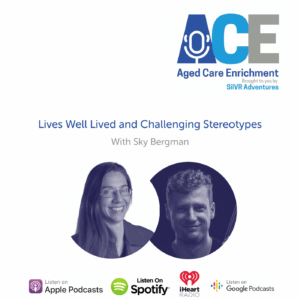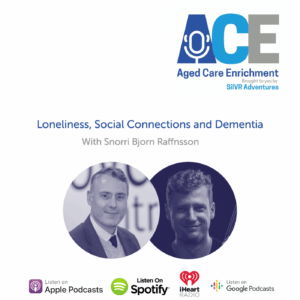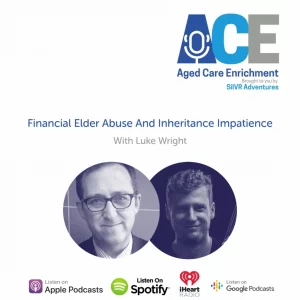Professors John Pollaers and Johanna Badcock represent Ending Loneliness Together, a charity committed to ending chronic, problematic loneliness. Since the arrival of the pandemic and it’s associated lock down, loneliness has never been a more pressing issue in our society.
Now more than ever individuals are required to isolate themselves from friends, family and colleagues and this doesn’t affect us all equally. As John points out, young employees are much more adversely affected by this, many of which are required to work from bedrooms throughout this period.
But there are ways to address feelings of loneliness in individuals, and the wider economic and productivity impacts of loneliness in businesses and the community. John and Johanna share some tools for addressing loneliness in our own lives, and some programs and resources that aged care providers can provide to team members who might need extra support at this time.
Transcript
Ash de Neef: John and Joanna Thank you so much for joining us today
John Pollaers: It’s a pleasure
Johanna Badcock: It’s a pleasure to be here
Ash de Neef: Now this is going to be kind of a loneliness special, we’re really diving into the issue of loneliness here. So before we we really tackle the issue head on can we get a bit of your background Johanna and maybe starting with you – you have a psychology background right
Johanna Badcock: Yes I trained originally as a clinician a clinical psychologist but then quickly got captivated by the research world. And so I’ve spent my career for the last 25 years or so as a clinician- researcher. Most of my early work was in the field of psychosis actually which seems far removed from what we’re talking about today though sadly is much closer than you think because it turns out that people with psychotic disorders have very high rates of loneliness in their lives, and they often say that loneliness is one of the most challenging things that they face in their day-to-day world. And that’s really what got me into the space, an interest of loneliness and how it impacts people.
Ash de Neef: Wow that’s fantastic – and not a statistic that I would have known there that
psychosis is so linked
Johanna Badcock: In the case of people with psychotic disorders they’re experiencing loneliness at about twice the rate of people in the general community.
Ash de Neef: Wow. So it’s it’s not just an issue in the general community but also in in more specialized communities as well.
Johanna Badcock: in certain groups yeah definitely much higher rates. And since then, actually through more family experience has got my interest in loneliness as well because I have a family member with dementia and a carer involved in that as well, and the experience of loneliness for them especially through Covid has been particularly prominent and very salient for me. So I’ve got an interest personally as well.
Ash de Neef: Yeah, that’s great that these things have brought you here and that you have a personal passion and John do you have a similar story I know you’re not coming from a research background but how did you get involved with loneliness
John Pollaers: Look my background was that I was a computer engineer and consumer products CEO for many many years. And when I retired I decided I wanted to set up my own business in an area that dealt with the issues of independence. So I in the last few years built the largest assisted technology company in Australia called Leef Independent Living Solutions which essentially provides technology and product solutions to functional cognitive decline in the elderly supporting those living with disability, dementia, and those undergoing rehabilitation. It all came about because I had two parents who passed away through the system, my wife also did and then in both cases they were subject to you know medication mismanagement, you know successive acute transfers to hospital and misdiagnosis of dementia. And then I had, well I have a disabled sister and a disabled nephew that I’ve been the guardian for for about 20 years. So one way or another I’ve been in this area, and the consequence of that is I really saw the impact that loneliness was having decided I want to do something about it and that’s how I became involved with Ending Loneliness Together
Ash de Neef: Yeah fantastic and that’s a really great segue, you are both here representing Ending Loneliness Together. Can one of you give me sort of an overview as to what the organisation does?
Johanna Badcock: Well perhaps I might step in there So we’ve been working as a group of community organisations and interested parties and researchers and academics for probably four or five years on an informal basis trying to get this group together. And we were formally launched just late last year we’re now also a registered charity in this space. And we came together partly because we felt very strongly that the issue of loneliness wasn’t really part of the everyday vocabulary of what people were talking about in society as an important issue. So we put together some key goals and the first of that was simply to raise awareness and inspire action around the problem of loneliness in Australia today.
Other countries have done the same sort of thing so in the UK for example quite a long time ago now they set up the UK campaign to end loneliness, and similarly there are other countries around the world that are following suit and really putting this on the national agenda if you like.
Another big issue that we really felt was important to address is that we want to be able to develop a really good evidence base for measuring loneliness and evaluating the best solutions because at the moment there’s quite a lot of approaches being trialed, but they very rarely are actually being evaluated so we don’t always know what works and what works for whom and in the right place and the right time. And that’s really just a measure of developing the resources and tools for community organisations and health providers to be able to do that a bit more effectively.
We also thought it was really important to bring all the relevant stakeholders together as well, so we’re really forming a network that we can share our expertise and use a common language if you like.
So there’s some of the goals that we have in mind.
Ash de Neef: Yeah that’s great – bringing together a lot of different people under the same banner for a same goal here. And I know that in residential aged care for example loneliness is is a really big issue – half of everybody living in a residential aged care will experience loneliness at some point. But John perhaps you can give us a scope of how big is this issue in terms of society as a whole.
John Pollaers: Oh it’s an enormous issue Ash.
I mean the thing that really struck me as early on in our research when we were looking at the order of functional decline and cognitive decline we noted that loneliness came up as probably the principle starting point for many mental health and physical health issues.
And in particular for you know for the case of healthy women perceived loneliness was a major factor that differentiated if you like ‘good ageing’ from ‘suboptimal ageing’. And in men it was depression which had a root cause of not feeling connected, not feeling a sense of purpose. And many of the same kind of attributes we see through many of residential care and we should not forget people who are ageing in place at home are not getting visitors and so high levels of apathy, if they’ve got continents issues they may not feel confident to go out and that just creates an a greater issue.
So it’s very widespread but what really struck me was then to watch the impact that it was having on those living with disability who were experiencing some of the same sense of isolation. And then of course COVID highlighted the very same issue for many young people stuck at home, where their bosses are quite happy now sitting in their home offices which are nice and comfortable with most of their employees sitting in a small bedroom you know living their life in a very small space and not being conscious of the need to keep people involved – and so we started to see some issues there.
But the most telling thing for me is that when you look across all the age groups there may be a peak in that kind of 25 to 30, there may be a peak in that you know 65 to 75 but it’s a very high level almost 40% across all age groups which says that loneliness it’s an endemic issue in the community that needs to be addressed.
Now my interest is not as scientifically founded as Jo and so I’m delighted to have Jo on the call today – but bottom line is if you’ve got that level of disconnection in the community then we have to fundamentally rethink our approaches to social equity and inclusion in our infrastructure design and the development of social policy in our health response. And given that it’s a causal issue ie. if you can deal with this it’s like skittles. This is the front skittle – if you knock this one down you get 10 knocked down. If you can deal with this skittle then we can make a massive difference to the community. So you know when I found Jo and the rest of the team are working on this I couldn’t help but say “I’m in” I need to be part of helping to be find a solution to this .
Ash de Neef: That’s great And it’s my perception that loneliness is an increasingly – it’s a growing issue and not just because of the pandemic right. Jo maybe you can shed some light on this. Is it that we’re more aware of loneliness or is it that people are experiencing more loneliness.
Johanna Badcock: Well look what you’re raising is a really important but complex point, is it the case that rates of loneliness are increasing?
And actually the evidence on that at least up until March last year was really mixed. There’s a fairly large study done by Louise Hawkley in the US what they did was have a look at rates of loneliness in the baby-boomer generation and compared that to similar older adults who were born from 1920 1947. So if you compare the rates of loneliness in those different age cohorts, there’s not really strong evidence at all that rates of loneliness are increasing over time.
That said there is local data within Australia that does seem to show that for younger adults there may be, more younger adults reporting an increase in loneliness over time. That is from about 2013 onwards.
So the question overall about whether loneliness is increasing, yeah there’s really not strong evidence as yet. What we do know though is that since the onset of the pandemic, from data that we’ve collected here in Australia, we do know that it is getting to be significantly more likely that all age groups are reporting feeling lonely. So I think the data locally says that around 1 in 2 feel more lonely than the once did.
Ash de Neef: Wow, and perhaps another factor that would contribute to effecting the data is more of a willingness to speak up about mental health issues and…
Johanna Badcock: Yes look I really think that is in a weird way one of the benefits, few that there, are of the covid pandemic. It has somehow given people a greater sense that they can talk about this issue. Because we do know that there is often a stigma attached to loneliness, and that plays out by way of making people reluctant to speak up about it, for fear of how other people are going to respond.
So it’s sort of been forced upon us in our lap because of the pandemic, but the positive spin from that is that people are a little bit more willing to say “you know what this has really sucked, and I’m really feeling lonely, and I really need to find a way to manage this and I need help.”
Ash de Neef: Yeah.
John Pollaers: Ash if I could add to that, as I come from the perspective of you know years of experience in consumer marketing.
The thing that I found very interesting about loneliness is that it’s a much easier way into the conversation around people’s overall state of well being than many other ways in. And although we’re starting to have the conversation, to ask somebody if they know whether somebody is lonely invites the question to understand it explore it and people will come to the discussion.
If you try to have a conversation around mental health or or other physical issues people are reluctant, and we found that that often people will say something about themselves that they feel is more appealing to the person listening whereas loneliness does enable you to get into a very real conversation.
And so that’s one of the things that I think needs be remembered as we start to think about this more as a causal issue is that it’s actually, with a little bit of work and backed up by the great quality of research that the Jo and the team in Ending Loneliness Together are doing. We should be able to really open up a number of very productive discussions with the community around how to think about this and how to respond to support.
Johanna Badcock: I probably also add to that, that when you start those conversations what’s really important and interesting in a sense is just how diverse everyone’s experience of loneliness is. So for some people the kind of connections that they’re missing are with a particularly close friend that they’re no longer able to get in contact with or see face to face.
For other people however it’s missing their work colleagues, or it’s just missing you know the person in the local shop that they normally see a regular basis and just have a bit of a chin-wag with, or the person that they see on their daily walk, walking the dog at the park.
So everyone’s experienced and the kind of connections that they feel that they are missing, that makes them feel lonely is really different. And it’s really important to recognise that because a lot of people just think that “oh you’re only lonely if you’re missing this sort of close support network” but actually it’s much much more than that. It goes way beyond that simple core support group.
Ash de Neef: Yeah And I’d really like to focus here on the antidote to loneliness or some potential antidotes, because I’m sure most people listening – myself I’ve definitely been surrounded by a lot of people before in a very social environment or a social lifestyle and felt very lonely. How do we address loneliness? Is it just more connections?
Johanna Badcock: Well that’s a a common first step and it’s probably not an unreasonable step because we do know that being objectively socially isolated, having few social contacts is one of the key drivers of loneliness.
But that said we also know that just fixing the number of social connections that you have doesn’t always make you feel less lonely. Because of course it’s to do with the quality of the relationship that you’re having.
What we do know is that when people are lonely, it can set off a kind of downward negative spiral. It changes your thoughts and your feelings and your behaviour, so that you feel a bit more negative about yourself and the world around you and certainly you tend to interpret situations more negatively as well.
And of course if you interpret a situation like say, you call someone on the phone and they don’t reply. If you’re instant interpretation is “uh I’m being dissed, or rebuffed or ignored” then you’re likely to respond in an irritated way when you do next contact them. And clearly that’s going to set off a not terribly good interaction cycle.
And so helping to address loneliness can therefore involve helping people to be a bit more aware and mindful of that kind of negative thought, belief, action cycle, and how to intervene and change how you interpret the situation. Maybe the person that you called was just busy, maybe they were driving, maybe they were doing any other activity that meant that they couldn’t get back to you.
If you change your thinking about it that way then you might respond a little bit more positively next time you talk to them and it helps to maintain the quality of that relationship.
John Pollaers: It’s interesting Ash if I can add to that also. A few weeks ago we put out a post that said should we have a minister for loneliness in Australia, and it was remarkable the number of people who responded to the post saying well no it should be a minister of social connectivity, and Jo makes the the like a very interesting point there that you can be in a group and be very lonely.
And so part of the anecdote is one helping people to understand where they are and be able to take steps for themselves but also to help others understand to take the time check in really be there for people that doesn’t mean occupy the airspace but it means be there and listen to provide support.
We used to look at when we were doing a lot of consumer work around social networking we actually realised that it was about ‘social not-working’, you know that you have to find a way of blending this online world now with more physical contact which is really important as we come out of this pandemic that the workplaces recognise that they’ve got to bring people together and create those kinds of linkages and blend it. Whether it be in the university whether it be in school whether it be in the workplace and particularly for young people entering into work.
I do remember a number of years ago though that we used to kind of talk about people who worked under pressure and I heard about a concept called the astronaut syndrome, and the notion was that you know three months in space their immune system starts to break down and you know comes on a sliding line over three months.
And the solution, they found this in research I believe in Antarctica and I can certainly believe it to be true in my own work experience is; that if you can take a week off at the end of those three months and not sit on a beach not isolate yourself but be connected in the community with family with friends then then you got to bounce back.
And I think that we’ve got to remember that over this last year people have been Isolated and under pressure whether it be through the barrage of news that we’ve had through that period of time on COVID, or the negativity coming out of the whole Trump re-election or the you know it was just or the way that the politicians federally been attacking the States there’s been an environment of negativity starting with the Bush fires and moving all the way through.
So that kind of constant pressure that astronaut syndrome is sort of happening, and we’ve got to take a bit of time now and recognise it and put in a bit of effort, and I think you know make sure that we do check in that we listened to people.
But it does mean being prepared to slow things down a little bit and then make sure that we get people back on the right footing
Ash de Neef: Both of you there have spoken to the need for awareness whether that’s awareness in one’s own behaviour or in the behaviour around you or even in the environment in which you’re in. That there’s not always a skill that comes easily to some people.
Are there some tips and tricks that you guys have or Jo maybe you’ve researched that can can help people kind of develop the skills?
Johanna Badcock: Look there’s not research that I’ve done myself, though I know that there’s other research out there. Just trying to focus where your attention is going, is a good port of call, because as I was saying before we know that when you’re lonely you tend to interpret things more negatively than perhaps needs be.
And the first step to being aware of that is to actually monitor where your attention is being drawn. And if you can do that even down to perhaps keeping a little diary of how you felt during the day and what your attention has been drawn to, you’ll start to see patterns – “oh I focussed a lot on something really negative on the news, and I really focussed on how critical a certain person was when they were talking to me” and so on.
So you’ll see that your attention is actually being taken up by negative things around you. And that’s the first step to be able to manage the change, so that you can then say “I’m now going to specifically shift my attention to other either neutral or even positive things” so that you’re not dominated by that negative mindset.
John Pollaers: I had a very simple tool to do exactly what Jo was saying through some tough times in my own life.
And that was I would text myself every day [a number] out of one to 10. And if 10 meant that I was very good with myself I was clear and anything less than 10 you know I would send send the text and really what I needed to do then is say “right what’s missing? What have I got to do to get myself to a ten today?”
And it really is as Jo puts it very clearly is – taking the time to think about how you’re thinking and put some immediate actions steps in place. So it doesn’t have to be rocket science It doesn’t have to be huge interventions, it’s just creating that little bit of space for you to think.
Ash de Neef: That’s a really great idea and and a great way to train yourself to be checking in and always making an effort to stay on top of that. But those are two sorts of tools you’ve mentioned there a journaling and and texting and one situation – I know some research has linked technology such as virtual reality or other communication devices to reducing loneliness and isolation. Are there any things that you guys are seeing that seemed to be promising ideas in the space?
Johanna Badcock: I haven’t been keeping an eye on that space, but I think it probably brings me back to a comment John made a little while ago. I think there’s probably a lot of positive scope for using virtual reality technologies to help people connect, but I think you need to have a blend of that kind of a connection with face-to-face in person connection to get the most benefit.
John Pollaers: I agree with that – I think we’ve had a fair bit of experience with virtual reality or augmented reality and serious gaming for people with different conditions. So we’ve worked with virtual reality as well and have found that it is the kind of stimulus and connection but the thing that’s been most magic is when people share their experience with others having had that experience.
And so I think that we’ve got a long way to go to have the adoption across Australia of some of the you know assistive technologies that can provide the support, but as Jo says it’s gotta be part of an overall approach not an end in itself.
So no I think I think it’s a huge area, and it’s a huge area for potential research as well.
Johanna Badcock: Absolutely.
John Pollaers: just to just see how we can optimise and really get the most effectiveness from it, but you just got to look at the smiles on people’s faces when they use it to know that it’s adding something.
Johanna Badcock: There’s likely to be some really novel applications too. So for example if you can encourage inter-generational contact through using virtual or augmented reality systems, you get the double benefit. Because you’ve also got that shared social experience across the generations, maybe between grandparents and grandchildren, and the adoption of the novel technologies. So yeah, a lot of scope for research and formal evaluation to see again what works, because sometimes also in this area your intuition makes you think “oh yeah that’s going to work” but sometimes, the data don’t hold that up. We just need to evaluate these things really well.
Ash de Neef: Yeah. And I like what you’re both saying there that technology in of itself is not a solution, It’s a tool that can be used and…
Johanna Badcock: It’s how it’s used.
Ash de Neef: Yeah, perhaps it’s a gateway into further connections or different types of connections, so that’s that’s really exciting
John Pollaers: I mean one of the things that it’s worth mentioning when Jo talks about research is, particularly for the listeners is.
Research nowadays is really informed by the co-design or living labs where you really are working with people in the research. And so it’s it’s far more effective than what we may all have in our minds was academic research of the past. And it really is valuable process to go through and you know to verify what the benefits are or even if you intuitively believe the benefits are there to start to really work out how to optimize it and get even more benefit from it.
But those areas of co-design co-development and living labs I think are amazing new approaches to research that add enormous value to the community and Ending Loneliness Together is really built off that notion of co-development and co-design.
Johanna Badcock: Definitely.
Ash de Neef: Yeah. That’s fantastic, and those often lead directly to consumer products that are designed by the users themselves, so that can be a fantastic pairing there.
Now we’ve been talking a lot about loneliness as relates to people in care or people who are might be in a care facility but also as you mentioned workers, and I imagined that there’d be a lot of lone workers within the aged care industry whether they’re nurses or care assistants who will be not having a whole lot of social interaction from day to day.
Are there programs or support networks that can be put in place by employers to support lone workers?
Johanna Badcock: On a specific point there it is probably not very well known that loneliness amongst the health workforce itself also a big problem. And I probably sound like a broken record but I’m a scientist and data is king. There’s lots of data out that rates of loneliness amongst doctors, nurses, psychologists and so forth are really high.
And as a response to that one of the things that Ending Loneliness Together is doing, slowly in the background unfunded, is we’re trying to develop some resources to help the healthcare professional.
So normally they do engage hopefully in some self care, and there are self care toolkits around but none are particularly targeted at loneliness. And so we’re going to fill that gap and we’re providing a resource in the background and we will be making that available on our website in the future.
Ash de Neef: Great.
John Pollaers: You know just the pitch there and Jo you opened that door beautifully you know. For any listeners who think they can you know make a donation to Ending Loneliness Together or who want to partner with the organisation to advance the research then funding is sorely needed.
This is an area that is new, it’s high-impact, it feeds into the lot of the service providers whether that be the Beyond Blues, the Lifelines, the Headspace they all benefit from understanding this and the kind of interventions that are going to make a difference. And so if you are in a position to contribute it’s much appreciated.
Ash de Neef: Fantastic. And something that might tack on nicely to the pitch there is trying to envisage what does the world and what does society look like when loneliness Isn’t the issue that it is today. What’s the vision here Jo can you paint us a picture?
Johanna Badcock: Well we set ourselves for ELT a fairly ambitious target of trying to reduce loneliness in half by 2030. I should probably clarify that in that what we’re really talking about here is ending chronic problematic loneliness, because we all have to recognise that loneliness is just part of being human right?
It occurs and it’s a normal signal that we need to attend to our social connections and rebuild some of our social groups and connections. And so it’s important that we don’t medicalise or pathologise, or overly pathologise loneliness itself because it really is a normal human experience.
I think what we’re really aiming for at Ending Loneliness Together is that we have a community that has a stronger set of skills to help them tackle those brief periods of loneliness, so that they can address it and mange it themselves or they can address it and manage it in someone that they know and love.
So if we can equip people with those skills that would be perfect.
John Pollaers: I think also you know if I look at the end age extremes you know we would be surfacing significant societal issues much much sooner because people would be talking about things And we’d be addressing them.
You know I think that’s where I’m fascinated as Jo and the team do more research to start to get real clarity on what those underlying themes are and starting to really surface them. I think as you then start to look in the ageing process for people living with disability it’s a much improved level of independence and quality of life and sense of self-determination.
Which are all going to be very critical in an underfunded medical system that we get to that because it will make a fundamental difference if you like you know that first skittle being knocked down. So you know I think Jo is absolutely right to say it’s a normal human emotion in some ways part of our strengthening and our journey through life you know requires us to experience these things to become fuller and more rounded human beings but when it gets that chronic level that’s the opportunity to change. And that’s the bit that creates the very very adverse impacts in the community and I think we will surface those issues and we’ll address those and the quality of ageing and living with disability will be much improved.
Ash de Neef: Fantastic Jo and John thank you so much for your time today, people can find out more at endingloneliness.com.au, thanks again.
John Pollaers: Absolute pleasure.
Johanna Badcock: Pleasure.






